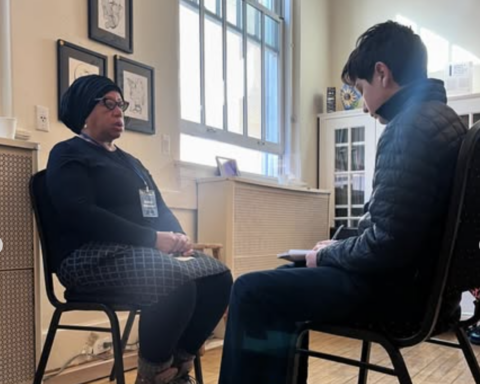While doing my daily scroll through YouTube, a video catches my eye. The case of Timmothy Pitzen. Click. A mother picks up her child early from school. Not out of the ordinary, maybe he had a dentist or doctor’s appointment. Little Timmothy was picked up at about 8:10 in the morning. His mother said there was a family emergency, and the school let him go; after all, it was the boy’s mother. Three days later, Amy Fry-Pitzen was found dead in a motel room in Rockford, Illinois and Timmothy was missing. The video went on, the narrator theorizing Timmothy was dead. Why had I clicked on such a gruesome video? Why did 600,000 other people click on it? Were we all invading the privacy of a poor family, who had just lost two family members? Is true crime ethical and why do we love it?
According to the Aurora Police Department, Amy Fry-Pitzen took Timmothy to the Brookfield Zoo in Wisconsin. They spent most of their day there and slept the night at a Great Wolf Lodge in Gurnee. The next day, they drove to Kalahari Resort, and Timmothy was never seen again. Amy was seen, on the other hand, entering a Dollar Store, then a restaurant, and finally a hotel later that day. She took her own life that night or morning by slashing her wrists and overdosing on antihistamines.
An inn employee found her there the next day at around 12:30pm, along with her suicide note and two letters, one addressed to her mother and the other to a friend of hers. In the note, she states that Timmothy would never be found but he was safe, with people who would care for him. I personally believe that Timmothy is dead, and she only said he was safe with those who care for him to convince herself she made the right choice. At first, authorities believed Amy and thought Timmothy was in the care of others as his car seat was missing. It turned out that Timmothy’s grandmother had it, and it had been in her possession for a week before he disappeared.
When police found Amy’s car, they sent it to a lab to be tested. A concerning amount of Timmothy’s blood was found. Despite this, they couldn’t tell how old the blood was and a relative said he had had a nose bleed 12-18 months prior. Additionally, the knife Amy had used to take her own life only contained her blood.
On April 3rd, 2019, Timmothy was found. Or was he? A man was found bruised and battered claiming to be Timmothy and that he had just escaped his captors. At this point, Timmothy would have been 13. Police took him to a children’s hospital where he refused a fingerprint test, raising suspicions about his true identity. It was soon revealed that the man was not Timmothy and instead a 23-year-old Brian Rini. Brian confessed that he had seen Timmothy’s story on the news and wanted to escape his own family. Brian’s older brother later told CNN that Brian had been diagnosed with Asperger’s and bipolar disorder. Timmothy remains missing.
If you found this gripping, you’re not alone. According to Edison Research, over 84% of the U.S. population ages 13+ consume some form of true crime. Be it a podcast, documentary, or a book, true crime has exploded over recent decades. Not only is it popular now, it was even popular in the 16th century, when crime pamphlet sales were skyrocketing. Psychologists believe that humans are drawn to violent topics because they have affected us since we were simple hunter-gatherers. It is embedded deeply within us to want to find out the whos, wheres, whens, and whys. Back when we were just trying to survive, we wanted to know such things to protect ourselves and our families. While this is still true, the appeal of true crime now can also be the fact that we, the listeners, watchers and readers, get to become amateur sleuths.
Timmothy’s case has attracted a lot of media attention, with a documentary, several podcast episodes, and countless articles. Each treats his case in different ways. Some give facts and give the full story, while others discuss theories. Most articles were from news sites, simply stating facts, while the podcast episodes usually gave their theories at the end and their own unique take. Oftentimes, when listening to a podcast and they state their opinion on a case, if they have statistics or evidence to back it up, I will believe it and have the same opinion, such as when Timmothy’s grandmother said she believed Amy took Timmothy to a Mormon commune. Amy was a converted Mormon and wanted Tim to grow up Mormon, but Jim had refused. If it sounds like a whole lot of baloney, like if a YouTuber said they believed Timmothy was alive with his family being hidden away with zero evidence, I wouldn’t care about their opinion.
This brings us to the question of whether or not true crime is ethical. News reports usually do not give opinions during the article and obtain consent from the victim’s family to be using the family’s name, age, and other personal information, yet podcasters and other true crime storytellers will give their opinions and do not obtain consent. Is it ethical to be expressing your own views on the case like a fact? Is it ethical to be violating the privacy of the family or the victim?
Laying a family’s private information out for outsiders to view and judge is wrong, but also, in my personal opinion, if the family gave consent to large news sites like CNN or The New York Times to use their names and age and other information, they can’t get too upset at retellers of their story. Anyone could have found your name and age even if some podcaster hadn’t used it. For example, Jim, Timmothy’s father and Amy’s husband, told news sources that Amy had previously attempted suicide. If a podcaster or YouTuber decided to mention it in their video, it technically isn’t an invasion of privacy, since Jim had publicly stated such.
True crime’s ethics have been debated since its earliest forms. In the 16th century, when crime pamphlets were being circulated, the main concern was whether or not it would interfere with the investigations. In the modern era of true crime, the concern is now focused on the victim and the victim’s family. There will always be debates on the ethics of stories of horrific crimes, and there will be no conclusion. After all, ethics are opinions, and not everyone will have the same opinion.
Hailey Kuo lives in South Bay and enjoys true crime, art, and reading in her free time.







